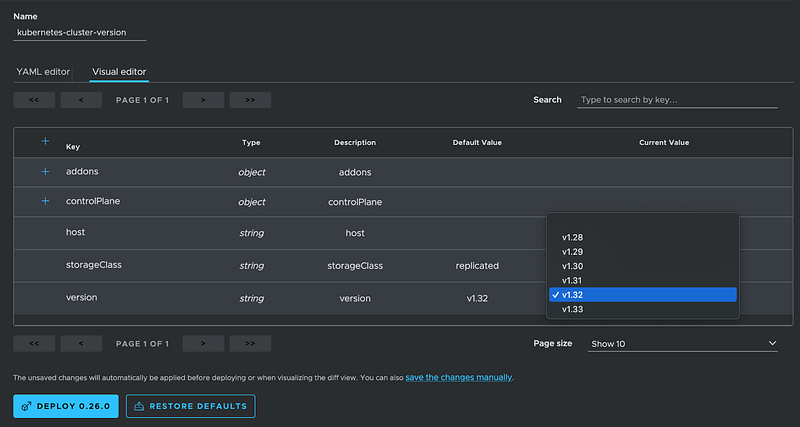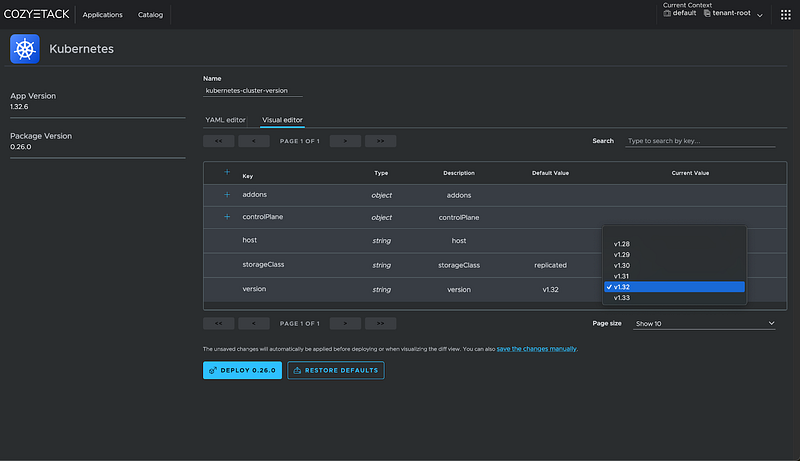Cozystack v0.34:
Cozystack v0.34: K8s Version Selection and PVC Snapshots in Tenants, Windows and RouterOS on VMs, VPA for VPA
Our maintainers and contributors never stand still, and we’re already ready to present the next stable release of Cozystack v0.34. In this release, we continued working on expanding the functionality of the Vertical Pod Autoscaler, improving tenant clusters, enhancing the backup system, and moving toward platform decomposition.
Below, we’ll cover the most important changes, and you can find the full list of fixes in the links at the end of the announcement.
What is Cozystack? Cozystack is a free PaaS and framework for building clouds that unifies VMs, containers, and GPU workloads under Kubernetes. Companies can turn hardware into a cloud: offer users or customers managed K8s, VMs, managed data bases, applications and GPU services. With KubeVirt integration, multi-tenancy, and bare-metal simplicity, it lets enterprises deploy AI, databases, or edge apps without vendor lock-in. Cozystack is a CNCF Sandbox project.
Major Features and Improvements
- Enable users to select Kubernetes versions in tenant clusters. Supported versions range from 1.28 to 1.33, updated to the latest patches.
- Enable PVC snapshot capability in tenant Kubernetes clusters.
- Implement autoscaling for the Vertical Pod Autoscaler itself, ensuring that VPA has sufficient resources and reducing the number of configuration parameters that platform administrators have to manage.
- Enable running Windows and MikroTik RouterOS in Cozystack VMs. Add the bus option and always specify bootOrder for all disks.
- Explain how to back up and restore PostgreSQL using Velero backups.
- Support multi-zone configuration for S3 storage.
- Put YAML editor first when deploying and upgrading applications, as a more powerful option. Fix handling multiline strings.
- Numerous API improvements and progress toward the new UI: OpenAPI schema for apps, OpenAPI Schema refactoring, using singular resource names in Cozystack API.
Security
- Ensure that JWT signing keys in the SeaweedFS security configuration remain consistent across Helm upgrades. Resolve an upstream issue.
New components versions
- FerretDB v2.4.0 (breaking change! before upgrading FerretDB instances, back up and restore the data following the migration guide).
- Talos Linux v1.10.5.
- LINSTOR v1.31.2.
- KubeVirt v1.5.2.
- CDI v1.62.0.
- Flux Operator 0.24.0.
- Kamaji to edge-25.7.1.
- Kube-OVN to v1.13.14.
- Cilium to v1.17.5.
- MariaDB Operator to v0.38.1.
- SeaweedFS to v3.94.
New Documentation
- Updated Cozystack Roadmap and Backlog for 2024–2026.
- Running Windows VMs.
- Running MikroTik RouterOS VMs.
- Public-network Kubernetes Deployment.
- How to allocate space on system disk for user storage.
- Resource Management in Cozystack.
- Key Concepts of Cozystack.
- Cozystack Architecture and Platform Stack.
Development, Testing, and CI/CD
- Improve workflow for contributors submitting PRs from forks. Use Oracle Cloud Infrastructure Registry for non-release PRs, bypassing restrictions preventing pushing to ghcr.io with default GitHub token.
All changes: v0.34.3, v0.34.2, v0.34.1, v0.34.0
Join the community
- Telegram group
- Slack group (Get invite at https://slack.kubernetes.io)

